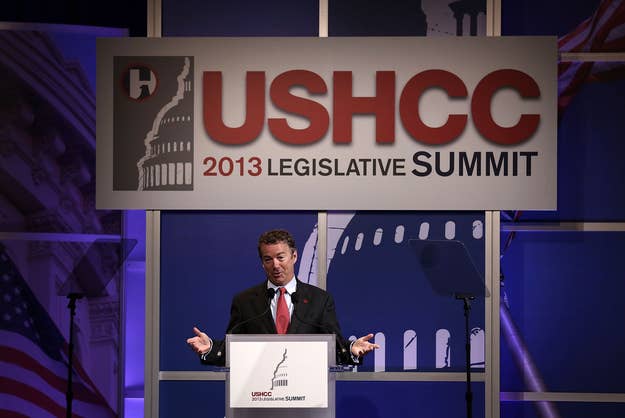
WASHINGTON — The choice of words can mean life or death for legislation in this town, a lesson that anyone watching Sen. Rand Paul's immigration speech at the Capitol Hilton learned this morning — after a furious debate erupted on Twitter and in the hotel hallways over whether the Kentucky Republican backs a "pathway to citizenship."
Paul introduced some new words to the charged immigration debate Tuesday: "assimilation" and "probation." These are the latest in a long line of terms aimed at soothing Americans enraged at the notion of allowing people who overstayed their visas or slipped across the border to become citizens. When pressed by reporters, Paul confirmed that immigrants who pass their probation may become, yes, citizens — but his abandonment of the stock phrase "pathway to citizenship" is only the latest twist in a painful semantic evolution on Capitol Hill.
The "pathway" is associated with the same plan for enhanced security and legalization of millions of immigrants that President Bush and a coalition of Democrats called "comprehensive immigration reform." But that innocuous phrase became seen as code for "amnesty," a word that itself had once been in vogue during the 1980s immigration fights. The pathway appears to the next to go: The Republican Party's Hispanic Leadership Network recently advised legislators to avoid it, in favor of saying that people can "earn" citizenship.
"The solution doesn't have to be amnesty or deportation-a middle ground might be called probation where those who came illegally become legal through a probationary period," Paul said in his speech, adding "Our land should be one of assimilation, not hiding in the shadows."
Paul, who is actively considering a bid for the 2016 GOP presidential nomination, did not use the phrase "pathway to citizenship." But, just as Democrats don't talk about "tax increases" but rather "revenue raisers," his calls for a probationary period followed by assimilation for the 11 million undocumented workers made clear he backs legalizing people here illegally and getting them into the citizenship process.
Conservatives and liberals alike balked, insisting that because he didn't use the phrase "pathway to citizenship" he was not, in fact, backing such a plan.
But that seems to have been the point. Paul is a savvy politician and he clearly understands that, like amnesty and "comprehensive immigration reform" before it, the phrase "pathway to citizenship" has become something of a dog whistle for conservatives, who see it as a gussied up version of amnesty.
Of course blanket amnesty isn't what lawmakers are talking about now. Instead, there is growing bipartisan backing for a system under which undocumented workers come out of the shadows, get work visas and are allowed to remain in the United States while they begin the citizenship process.
And, as Paul made clear following the speech, that's exactly what he's supporting. When asked if his plan granting work visas to the 11 million undocumented workers in the country would mean they could, eventually, become citizens, Paul said yes.
"What happens is the same thing as now but you wouldn't have to go home. You get in the same lines where ever you sign up, that's where you go … you don't go to the front of any line," Paul said.
He's right, mostly. Right now, people from other countries come to the United States every day on work visas, many of which provide an avenue — or (choose your own metaphor!) a pathway — towards eventual citizenship.
Paul's plan wouldn't be exactly like current law, since those 11 million people aren't actually eligible to enter that process. But it also wouldn't include any "perks" for undocumented workers and would force them to the back of the line.
The idea isn't particularly new, and any number of Democrats and Republicans like Sen. Marco Rubio already support it. But, using words like "probation" and "assimilation" are new and appear to be a clever rhetorical workaround that helps Paul avoid using "pathway to citizenship."
Paul seemed in on the rhetorical joke of how politicians talk about immigration Tuesday when he told reporters of the front of the line versus back of the line distinction.
"You get in the same lines, you get in the line wherever you sign up, you don't go to the front of any line," Paul said. "I know that sounds silly but front or back of the line seems to be this thing that's really important to people."
